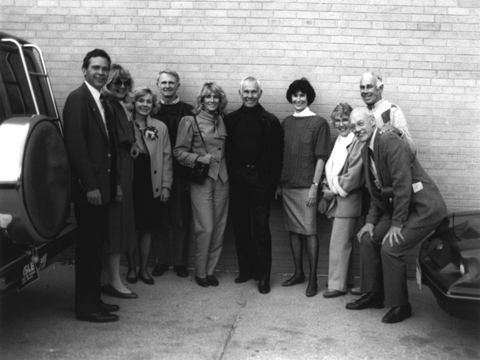| |
|
|

from the issue of January 27, 2005
|

| |
|
|
| |
Carson remembered for philanthropic legacy

BY TOM SIMONS, UNIVERSITY COMMUNICATIONS
Members of the university community who knew alumnus Johnny Carson praised his legacy as a comedian and philanthropist.

| | 
 
| | | In this undated photo taken outside the Johnny Carson Theater at the Lied Center, Carson (center) stands with a number of people. Right of him is the late Sheila Griffin, who was an early director at the Lied. On the far left is Terry Fairfield, CEO of the NU Foundation.

|
Carson, who became an American icon as host of NBC's "The Tonight Show" from 1962 until his retirement in 1992, died Sunday in Los Angeles of emphysema. He was 79.

Throughout his successful career, Carson maintained a strong relationship with the university, and last November announced a gift of $5.3 million to the NU Foundation to support the Hixson-Lied College of Fine and Performing Arts' Department of Theatre Arts. The gift will support the renovation and expansion of the Temple Building, located at 12th and R streets on City Campus, and will create an endowment to keep performance spaces equipped with the latest advances in lighting and sound technologies and assist students and programs in the department.

In December 1993, Carson received the Kennedy Center Lifetime Achievement Award. The University of Nebraska publicly said thanks to Carson through the Cornhusker Marching Band's performance of "There is No Place Like Nebraska" and "The Tonight Show Theme" with Doc Severinsen during Carson's nationally televised tribute.

In the 1970s, he established an endowed scholarship at the NU Foundation to assist outstanding Nebraska high school graduates. To date, these scholarships have helped 24 students with their education at the university.

In 1988, Carson gave a gift to support the construction of the Lied Center for Performing Arts. The black box theatre adjoining the main stage was renamed the Johnny Carson Theater in his honor.

Jack Oliva, dean of the Hixson-Lied College of Fine and Performing Arts, said Carson always recognized the importance of his education at Nebraska.

"Johnny Carson never forgot where he came from, or that the university played an important role in the development of his many talents in those early years," Oliva said. "His generosity to the state of Nebraska and to the University of Nebraska was tremendous, and while we in the college will certainly remember him for his most generous gift to support the Temple Building renovation and our programs in the Department of Theatre Arts, we will be even more mindful and appreciative of his artistic contributions to the world of entertainment and television. His enduring legacy at the university will be the students who we hope will follow in his footsteps as creative artists for generations to come.

"Johnny Carson's generosity will allow generations of Nebraskans to attend college, pursue their dreams in theatre and film, and enjoy the performing arts," said University of Nebraska President James B. Milliken. "He never forgot the impact of his studies at the University of Nebraska on his life and career. And Nebraska will never forget the lasting positive impact of one of her favorite sons."

Carson was born in Corning, Iowa, on Oct. 23, 1925, and grew up in Norfolk, Neb. He served in World War II in the Navy as an ensign, before enrolling at the University of Nebraska in 1947. Carson received his bachelor of arts degree in radio and speech (with a minor in physics) in 1949.

His 1949 senior thesis was titled "How to Write Comedy for Radio," which he recorded on a reel-to-reel tape. The 50-minute recording was a scholarly examination of the techniques and devices that radio comedy writers used to construct the jokes and gags in comedy radio shows. Using bits from several well-known comedians, such as Jack Benny and Bob Hope, Carson illustrated the various techniques used to write comedy, which he later effectively used in television through his "Tonight Show" monologues.

Carson also served as master of ceremonies for the male dramatic society Kosmet Klub shows on campus from 1947-1949, and he once dressed in drag to become the first man to ever emcee the female Co-Ed Follies Show in 1948.

Both Carson and his brother, Dick ('51), were members of Phi Gamma Delta fraternity. John Carson starred in the Fiji's Kosmet Klub skits. The fraternity won first place in the 1947 Kosmet Klub fall revue for their skit, "She Was Only a Pharaoh's Daughter, But She Never Became a Mummy," which featured Carson as Cleopatra.

His sister, Catherine ('45), was a member of Kappa Alpha Theta sorority.

While at the University of Nebraska, Carson performed locally at the American Legion, VFW and local clubs in Lincoln at night, practicing the skills he learned during the day in the Temple Building. Carson also wrote and did shows for KFAB radio, then broadcasting from Lincoln.
GO TO: ISSUE OF JANUARY 27
NEWS HEADLINES FOR JANUARY 27
Carson remembered for philanthropic legacy
Kimmel Center project under way in Nebraska City
Police warn: beware of phony invoice scams
A Piece of University History
Initiative receives 100 proposals
Milliken installation, higher education discussion today
Strategic planning update from Vice Chancellors Couture and Owens
731973S34139X
|
|
|
|
|
|
|
|